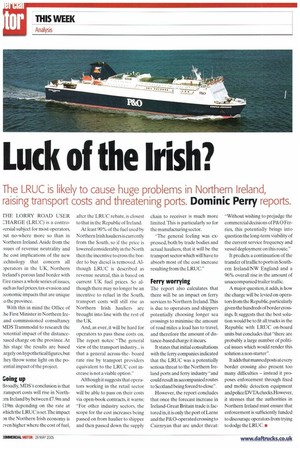Luck of the Irish?
Page 20

If you've noticed an error in this article please click here to report it so we can fix it.
The LRUC is likely to cause huge probienns in Northern Ireland, raising transport costs and threatening ports. Dominic Perry reports.
THE LORRY ROAD USER CHARGE (LRUC) is a controversial subject for most operators, Dut no-where more so than in !'%Torthem Ireland. Aside from the ssues of revenue neutrality and :he cost implications of the new :echnology that concern all Jperators in the UK, Northern Ireland's porous land border with Eire raises a whole series of issues, ;uch as fuel prices, tax-evasion and 2.conomic impacts that are unique :o the province.
With this in mind the Office of he First Minister in Northern IreAnd commissioned consultancy VIDS Transmodal to research the potential impact of the distance3ased charge on the province. At his stage the results are based .argely on hypothetical figures,but :hey throw some light on the po:ential impact of the project.
Going up
Broadly, MDS's conclusion is that .ransport costs will rise in North.:rn Ireland by between £7.9m and 119m depending on the rate at xhich the LRUC is set.The impact Dn the Northern Irish economy is even higher where the cost of fuel, after the LRUC rebate, is closest to that in the Republic of Ireland.
At least 90% of the fuel used by Northern Irish hauliers is currently from the South. so if the price is lowered considerably in the North then the incentive to cross the border to buy diesel is removed. Although LRUC is described as revenue neutral, this is based on current UK fuel prices. So although there may no longer be an incentive to refuel in the South, transport costs will still rise as Northern Irish hauliers are brought into line with the rest of the UK.
And, as ever, it will be hard for operators to pass these costs on. The report notes: "The general view of the transport industry.., is that a general across-theboard rate rise by transport providers equivalent to the LRUC cost increase is not a viable option."
Although it suggests that operators working in the retail sector will be able to pass on their costs via open-book contracts, it warns: "For other industry sectors, the scope for the cost increases being passed on from haulier to shipper and then passed down the supply chain to receiver is much more limited. This is particularly so for the manufacturing sector.
-The general feeling was expressed, both by trade bodies and actual hauliers, that it will be the transport sector which will have to absorb most of the cost increase resulting from the LRUC."
Ferry worrying
The report also calculates that there will be an impact on ferry services to Northern Ireland. This is due to operators and shippers potentially choosing longer sea crossings to minimise the amount of road miles a load has to travel, and therefore the amount of distance-based charge it incurs.
It states that initial consultations with the ferry companies indicated that the LRUC was a potentially serious threat to the Northern Ireland ports and ferry industry "and could result in accompanied routes to Scotland being forced to close".
However, the report concludes that once the forecast increase in Ireland-Great Britain trade is factored in, it is only the port of Lame and the P&O-operated crossing to Cairriryan that are under threat: "Without wishing to prejudge the commercial decisions of P&O Ferries, this potentially brings into question the long-term viability of the current service frequency and vessel deployment on this route."
It predicts a continuation of the transfer of traffic to ports in Southern Ireland/NW England and a 96% overall rise in the amount of unaccompanied trailer traffic.
A major question, it adds, is how the charge will be levied on operators from the Republic,particularly given the hundreds of border crossings. It suggests that the best solution would be to fit all trucks in the Republic with LRUC on-board units but concludes that "there are probably a large number of political issues which would render this solution a non-starter".
It adds that manned posts at every border crossing also present too many difficulties — instead it proposes enforcement through fixed and mobile detection equipment and policeiDVTA checks.However, it stresses that the authorities in Northern Ireland must ensure that enforcement is sufficiently funded to discourage operators from trying to dodge the LRUC












































































































































































































































